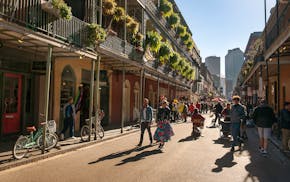Jon Hickey is enrolled in the Lac du Flambeau Band of the Anishinaabe Indians and follows tribal politics fairly closely. And yet he has this question: How authentic of an Indian is he?
"That debate is a sort of sport among Indians, I find," said Hickey, 44, whose novel "Big Chief" is out Tuesday. "I think a lot of people who are enrolled or have some sort of connection to a nation, a tribe, feel varying degrees of: Are you Indian enough? Are you from the reservation? Do you go to ceremonies? Do you outwardly fill the markers of 'Indianness?'"
Those themes are explored in "Big Chief," which is set in and around a Wisconsin reservation in the days leading up to the election of a new tribal president. Mitch Caddo is running a reelection campaign for a friend, growing more disgusted by the political maneuvering, when he runs afoul of an opposing candidate, whose campaign is run by Mitch's on-again/off-again squeeze, Layla.
Hickey grew up in Mankato, Northfield and Apple Valley but now lives in San Francisco (his parents split their time between St. Paul and the Lac du Flambeau reservation in northern Wisconsin). He had thought of writing about tribal politics for a long time, particularly in the years since the Lake of the Torches casino transformed the community. But he didn't have a story.
"That started emerging about 2016, happening to coincide with a certain former TV host running for president," said Hickey. "It took a few drafts to find what I was really trying to say, which was maybe not as much about the politics as about the feeling of being a citizen of this nation but disconnected from it."
In "Big Chief," Mitch and other characters grapple with that same feeling. Mitch tries to use hazy information about the "Indianness" of the opposing candidate to discredit her, knowing that kind of insecurity is common to many Native people who don't live on reservations or participate daily in the life of their community.
"I get into this with my cousins a lot, this insecurity about whether you really do belong to this place," said Hickey. "The reservation is a site of what I recognize as spiritual, the things I recognize as sacred. It's the source of that but I've also never lived there, so it's this sort of faraway land. My grandparents moved to Chicago during a relocation in the 1950s and in a lot of ways that story, to me, resembles immigration stories."
Several "Big Chief" characters have similar stories, of having left the reservation only to return to it. For Hickey, the return to the reservation of his parents and grandparents has helped it feel like home for him, too.
It also helps him feel like he's not, as Mitch is insultingly referred to in "Big Chief," a "J. Crew Indian."
"Oh, no! I've created a new archetype!" joked Hickey about the phrase, adding that he often speaks about this with his mom, Melanie Peterson. "She was born in Illinois and has lived most of her life off the reservation and, even with just one degree of separation, she's felt 'inauthentic.' She was the first in her family to go to college and that was something that set her apart, that she was somebody who wanted to make a life off the reservation."
One aspect of "Big Chief" and "Indianness" that may come as a surprise to some readers is the book's debates about whether or not to kick members out of the tribe. That threat hangs over Mitch's political rival in "Big Chief," and Hickey worries about the divisiveness of disenrolling "inauthentic" members, which is why one of his characters says, "The flaw, as I've come to see it, is that we were working with the wrong tools, ones that were imposed on our people long ago."
Said Hickey, "It's a thing that's done for political reasons and cultural reasons and grudges between families, sometimes. It seems like a very nasty thing to do: to take away somebody's enrollment like that. The disenrollment part doesn't happen as much in Flambeau as banishment does, another mechanism in the book. It's an exercise of power, that this thing that is so essential to your identity can be taken away."
Those kinds of debates underscore another important theme of "Big Chief," which is that anyone who attempts to sum up the "Native perspective" is doomed, because there are as many perspectives as there are Native people. This becomes evident in one of the book's key scenes, a Thanksgiving dinner.
"I've had a couple Thanksgivings at the reservation," said Hickey. "In Wisconsin, you'll find a range of opinions, from people who want to be sure to underscore the political undertones of the holiday, to people who just want to have some turkey. It's a range. It goes back to the reason I'm writing the book, which is that there's such a wide spectrum of Indigenous experience, even in my own family."
It was his family — specifically, his two young sons — that Hickey was thinking of when he wrote "Big Chief." That's one reason the book's propulsive and sometimes tragic events end on a hopeful note.
"I started the book when my oldest son was a month old. I think that was probably on my mind," said Hickey.
And that's when it occurs to him that he composed early drafts of "Big Chief" — set on a reservation not unlike Lac du Flambeau — at the same time he was completing the paperwork to make sure that, like him, his oldest son would feel at home there.
Big Chief
By: Jon Hickey.
Publisher: Simon & Schuster, 308 pages.
Event: 6 p.m. April 11, Milkweed Books, 1011 S. Washington Av., Mpls. Free, reservations encouraged.

Minnesotans find beautiful views, food and fun on trip to New Orleans via train
Ever wonder why the Northwest produces so many serial killers?

Embrace Minnesota's growing seasons at these 76 farmers markets

Old School Jewish Matchmakers offer timeless perspective on dating
